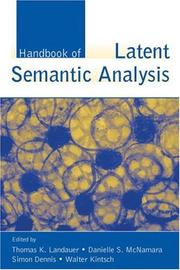| Listing 1 - 2 of 2 |
Sort by
|

ISBN: 0805854185 9780805854183 1135603286 0203936396 9780203936399 9781135603281 9781135603236 9781135603274 9781138004191 Year: 2007 Publisher: London Lawrence Erlbaum Associates
Abstract | Keywords | Export | Availability | Bookmark
 Loading...
Loading...Choose an application
- Reference Manager
- EndNote
- RefWorks (Direct export to RefWorks)
Lexicology. Semantics --- Mathematical linguistics --- Semantics --- Data processing --- Mathematical models --- Psychological aspects --- Semantiek --- Logopedie --- Taal --- Therapie --- Kleuter --- Geschiedenis --- Spraaktechnologie
Book
ISBN: 9780262035613 0262035618 0262337371 9780262337373 Year: 2016 Publisher: Massachusetts The MIT Press
Abstract | Keywords | Export | Availability | Bookmark
 Loading...
Loading...Choose an application
- Reference Manager
- EndNote
- RefWorks (Direct export to RefWorks)
An introduction to a broad range of topics in deep learning, covering mathematical and conceptual background, deep learning techniques used in industry, and research perspectives. Deep learning is a form of machine learning that enables computers to learn from experience and understand the world in terms of a hierarchy of concepts. Because the computer gathers knowledge from experience, there is no need for a human computer operator to formally specify all the knowledge that the computer needs. The hierarchy of concepts allows the computer to learn complicated concepts by building them out of simpler ones; a graph of these hierarchies would be many layers deep. This book introduces a broad range of topics in deep learning. The text offers mathematical and conceptual background, covering relevant concepts in linear algebra, probability theory and information theory, numerical computation, and machine learning. It describes deep learning techniques used by practitioners in industry, including deep feedforward networks, regularization, optimization algorithms, convolutional networks, sequence modeling, and practical methodology; and it surveys such applications as natural language processing, speech recognition, computer vision, online recommendation systems, bioinformatics, and videogames. Finally, the book offers research perspectives, covering such theoretical topics as linear factor models, autoencoders, representation learning, structured probabilistic models, Monte Carlo methods, the partition function, approximate inference, and deep generative models. Deep Learning can be used by undergraduate or graduate students planning careers in either industry or research, and by software engineers who want to begin using deep learning in their products or platforms. A website offers supplementary material for both readers and instructors.
Probability theory --- Information systems --- Artificial intelligence. Robotics. Simulation. Graphics --- Mathematical linguistics --- analyse (wiskunde) --- Machine learning. --- Artificiële intelligentie --- Machine learning --- Learning, Machine --- Artificial intelligence --- Machine theory --- למידה חשובית --- Apprentissage automatique --- Machine Learning --- Apprentissage automatique. --- Transfer Learning --- Learning, Transfer --- Machinaal leren --- 681.3*I2 --- 681.3*I2 Artificial intelligence. AI --- Artificial intelligence. AI --- deep learning --- machine learning --- artificiële intelligentie (AI) --- Informatique --- Intelligence artificielle --- Aprenentatge profund --- Aprenentatge automàtic
| Listing 1 - 2 of 2 |
Sort by
|

 Search
Search Feedback
Feedback About UniCat
About UniCat  Help
Help News
News